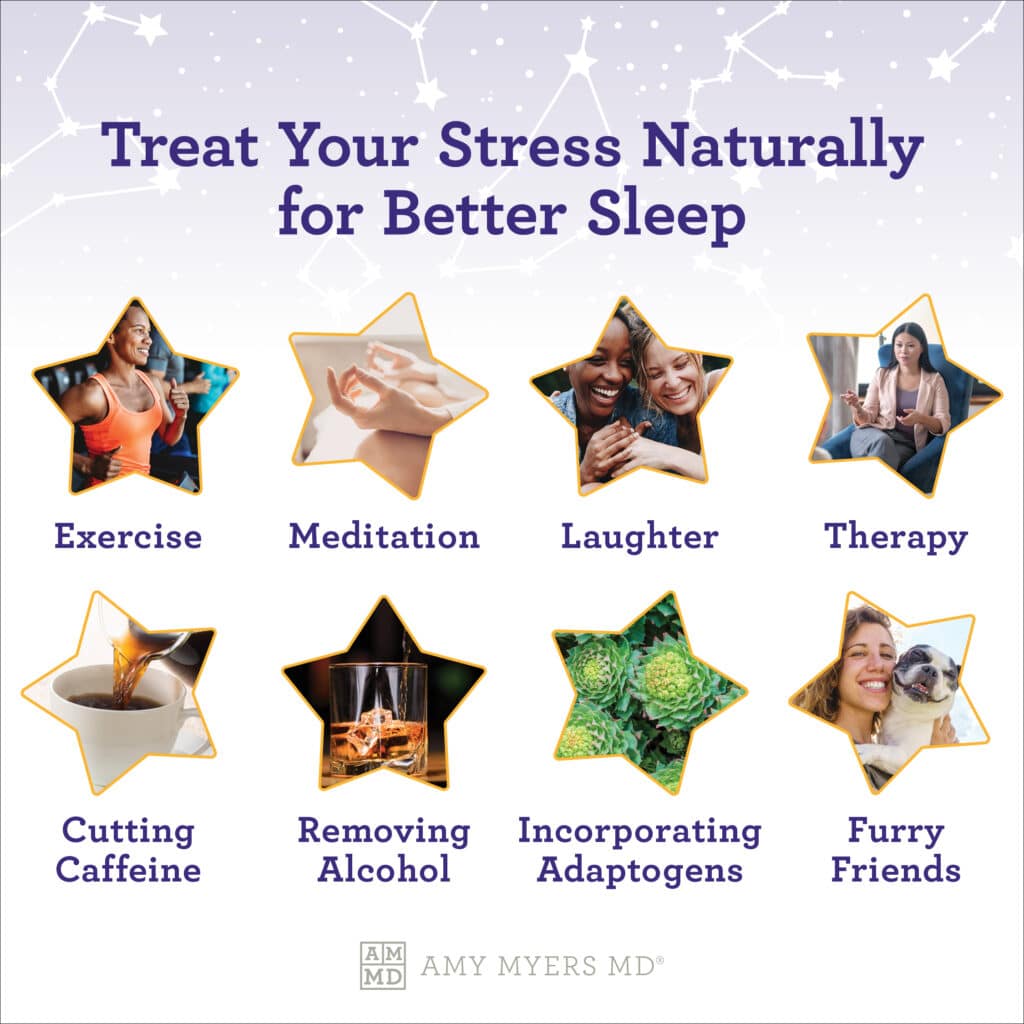Sleep and stress can positively and negatively affect each other, your life, and your health. In fact, the benefits of optimal sleep are so far-reaching that you’ll be amazed by how restful, restorative sleep can change your world and reduce your stress. Yet, consider your stress level if you aren’t getting quality sleep. Sleep and Stress share a unique, reciprocal relationship.
For instance, stress can negatively affect sleep if you are under regular stress. Consequently, your stress levels can be negatively impacted if you aren’t getting enough quality sleep. If your head is spinning, don’t worry. I will tell you all about the sleep and stress connection and my proven solution to address sleep and stress. Let’s dive into this relationship between sleep and stress.
Sleep and Stress’ Reciprocal Relationship
Sleep is a function that allows your body to recharge, refresh, and rebuild its cells. After a restful night’s sleep, your memory improves, and you are more alert for the next day! It’s also crucial for our brain health.
The alarming part is that many Americans struggle to sleep each night. The Centers for Disease Control and Prevention estimate one-third of Americans don’t get enough sleep.1
If you lack quality sleep, it is detrimental to your overall health and increases your risk of developing chronic issues, including hypertension, heart disease, diabetes, depression, and obesity increases dramatically. It can impact your brain health – memory, learning, and creativity can all be affected. It doesn’t have to be this way! Let’s look at how stress affects sleep and how sleep can impact stress.
How Stress Impacts Sleep
Stress isn’t just a feeling. It’s a response to a life-changing event, such as a breakup or death in the family, financial troubles, a high-demanding job, or physical injury. Your stress response keeps you alive in a dangerous situation, and it does this through the body’s stress hormone cortisol.
Cortisol turns on your body’s “fight or flight” mode when faced with a dangerous situation. Our stress response evolved primarily as a means of self-preservation from our ancestors facing immediate, life-threatening situations. Unfortunately, that response isn’t ideal for the chronic, ongoing stress we face today.
The occasional stress is fine and perfectly normal. However, when your adrenal glands are on high alert due to chronic stress, this can lead to too much cortisol in the bloodstream, which has several effects on your body, including impacting your sleep.
Insomnia is the most common effect of high-stress levels.2 When you face stress, your brain continuously processes what is causing your stress. As you try to sleep, the thoughts race through your brain and disrupt your sleep patterns. The consequence of these racing thoughts is sleep loss, which triggers your body’s stress response and elevates cortisol levels even more.
Learning natural ways to reduce stress such as exercise, infrared sauna therapy, eating a nutrient-dense diet, and limiting alcohol can help you achieve more quality sleep. I’ll talk more about this later.
How Sleep Impacts Stress
The paradox is that getting quality sleep is one of the best ways to reduce stress, and getting more restful sleep decreases cortisol levels.3 If you get regular quality sleep, your body can function optimally. For example, restful sleep positively impacts your brain health and improves your mood.
Following a regular sleep routine calms and restores the body, improves concentration, regulates mood, and sharpens judgment and decision-making. You are a better problem solver and can manage stress better when you’re well-rested. Lack of sleep, on the other hand, reduces your energy and diminishes mental clarity. I’ll tell you how to get optimal sleep in just a bit. Now, let’s discuss stress.
What Is Stress?
As I mentioned, stress is your body’s response to dangerous situations. Your body processes stress the same way each time you face any type of stress– through the adrenal glands. The adrenal glands respond by creating a flood of stress hormones, including cortisol, affecting both your digestive and immune systems.
Our stress response evolved primarily as a means of self-preservation from our ancestors facing immediate, life-threatening situations. Unfortunately, that response isn’t ideal for the chronic, ongoing stress we face today.
The occasional stress is fine and perfectly normal. However, when your adrenal glands are on high alert due to chronic stress, this can lead to too much cortisol in the bloodstream, which has several effects on your body, including the development of autoimmune disease.
Chronically elevated cortisol also leads to weight gain and fat storage, resulting in blood sugar imbalance, muscle wasting, sex hormone dysregulation, and more. Your adrenal glands must work incredibly hard to keep up with a needless demand, which fatigues them, leading to adrenal dysfunction and burnout. The good news is that by managing your stress naturally, you can reverse its impact on your health and improve your sleep.
How to Manage Stress Naturally
You can manage stress naturally in many impactful ways. Any activity that can flip the balance from a cortisol surge to a surge of other hormones, such as serotonin, can help break the stress cycle. Here is a list of ways to manage stress:
 Dr. Amy Myers
February 5th, 2023
https://content.amymyersmd.com/article/sleep-and-stress/Sleep and stress infographic – Amy Myers MD®
Dr. Amy Myers
February 5th, 2023
https://content.amymyersmd.com/article/sleep-and-stress/Sleep and stress infographic – Amy Myers MD®- Exercise: Going for a run or lifting some weights can provoke a surge of endorphins and help level out a stress response.
- Meditation: Mindfulness or intentional breathing can help reduce your stress levels.
- Laughter: A hearty belly laugh can release endorphins, promoting your sense of well-being and lowering your feelings of stress.
- Removing caffeine or alcohol: When you remove dietary substances that can negatively impact your sleep, you can reduce your stress level by increasing your sleep quality.
- Adaptogens: These plants and mushrooms can help you manage different kinds of stressors by helping restore your body’s hormonal balance.4 I formulated ZenAdapt™ to include the right amount of adaptogenic herbs to promote optimal cortisol levels and support a balanced stress response.
- Therapy: Developing a relationship with a professional therapist can give you an outlet for expressing difficult emotions, which can help you gain perspective and learn effective coping mechanisms to manage stress better.
- Furry friends: Research has shown that petting a dog or cat can help lower your cortisol level and increase your feeling-good hormones.5.
While addressing ways to manage your stress, you’ll also want to promote quality sleep. I have the best solution to achieve optimal sleep, which will also positively impact your stress.
A Doctor’s Solution to Achieve Optimal Sleep
Modern society bombards you with everyday stressors that impact restful sleep cycles and negatively impact your brain health. Poor sleep habits, including not going to bed and getting up simultaneously each day, can hurt your sleep. The four biggest culprits of sleep include:
- Light: We are surrounded by bright lights and technology that delays your sleep cycles.
- Stress: Everyday stress can lead to less time in deep sleep, and even short-term stressors decrease sleep efficiency and impair the processing of fact-based memories.
- Diet: Refined sugar, caffeine, and alcohol negatively impact your quality of rest.
- Aging: Most people find that they have a more challenging time falling asleep as they age, possibly due to magnesium deficiency.
While you can’t do anything about getting older, you can take control of the other three culprits. Let me tell you about my simple steps in achieving restful sleep.
How to Achieve Optimal Sleep
The best way to get restful sleep is to follow these three simple steps:
- Eat foods rich in tryptophan, magnesium, and melatonin. Turkey, chicken, and shellfish are excellent sources of tryptophan, while bananas, avocados, and green leafy vegetables contain a lot of magnesium. Your body naturally produces melatonin. However, you can also get it from pork, salmon, and cherries.
- Skip fatty foods, rich proteins, chocolate, alcohol, coffee, and over-the-counter medications that could contain hidden caffeine and sugar. Check your labels!
- Get tired naturally by having a regular sleep schedule that includes waking up early and going to bed early. Exercise and creating a bedtime routine are great ways to promote optimal sleep.
Bonus tip: If you’re a hot sleeper like me, I cool down at night with help from my Cube Sleep System with Chilipad® Cool Mesh™ by Sleep.Me. It matches my body’s core temperature to improve the quality of your sleep and comfort level. I use mine every night.
Support Restful Sleep
We all can use a little support from time to time. My best tools to promote restful sleep patterns is Rest and Restore™ and Rest and Restore Max™.
Rest and Restore™ is a physician-formulated combination of amino acids and minerals designed to support falling asleep fast and promote deep, restful sleep. With optimal magnesium levels, Rest and Restore™ even help support relaxation during the daytime by facilitating a healthy stress response and relieving the occasional muscle tension. Being less stressed during the day will increase your sleep efficiency and improve brain health.
Rest and Restore™ also includes L-Theanine, a unique amino acid in green tea. L-Theanine promotes an alpha brainwave pattern often associated with a calm state, such as meditating or reading a good book on your day off.
If you need maximum level support for sleep, I recommend Rest and Restore Max™ to maximize optimal sleep and promote a natural sleep pattern. Not only does it contain the same ingredients as Rest and Restore™, yet it also features three additional essential ingredients to help those who have particular difficulty falling and staying asleep – melatonin, valerian root, and 5-Hydroxytryptophan.
Valerian Root is a natural stress reliever that supports both sleep and stress. I included optimal amounts of 5-HTP when formulating Rest and Restore Max™. 5-HTP is a natural amino acid your body produces for optimal brain health to promote relaxation.
If you need that extra boost of stress relief during a particularly tough period in your life, Rest and Restore Max™ may be the better option for you.
The Final Word on Sleep and Stress
Sleep and stress share a reciprocal relationship that can have positive and negative effects on each other. Getting enough sleep in the deep sleep stages is essential for managing stress levels. However, if you are chronically stressed, your sleep is negatively impacted. The empowering part is that you can use these tools to get restful, restorative sleep and manage stress.
Article Sources
- 1 in 3 adults don’t get enough sleep. Centers for Disease Control and Prevention. 2022.
- How stress can affect your sleep. Kaylee Dusang. Baylor College of Medicine. 2019.
- How Sleep Can Affect Stress. Banner Health. 2021.
- Adaptogens. Cleveland Clinic. 2022.
- The Friend Who Keeps You Young. Johns Hopkins Medicine. 2022.
